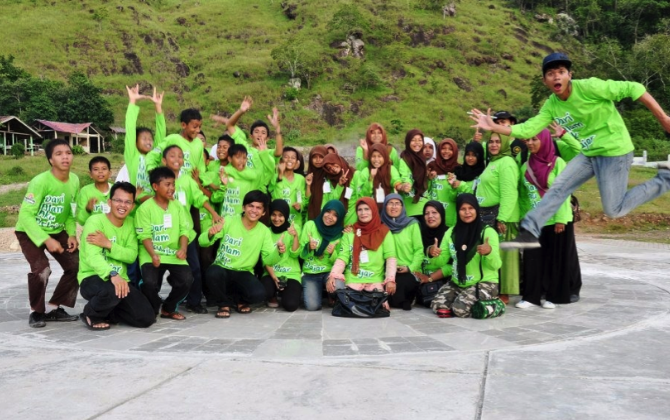Indonesia School Program to Improve Resilience (INSPIRE)
The Newton fund, Institutional Links provides grants and collaboration partnership with higher education institutions in the UK and partner countries.

1 March 2018
The £735 million fund is managed by the UK’s Department of Business, Energy and Industrial Strategy and aims to facilitate various research to tackle development challenges globally until 2021.
University College London, Institute for Risk and Disaster Reduction was successful in being awarded one of the projects: INSPIRE: Indonesia School Program to Improve Resilience
The Research Challenge
The World Disasters Report 2016 shows a drastic increase in people affected by natural hazard related disasters in Official Development Assistance (ODA) countries, particularly in Southeast Asia. This trend is due to growing urbanisation, the rapid increase in poorly built infrastructure, uncontrolled land development, and increasing exposure and vulnerability of populations to natural hazards. The World Bank estimates that disasters can hit developing countries with an economic force that can roll back development gains and exacerbate inequality. Specifically, in the 2015 Centre for Research on the Epidemiology of Disasters (CRED) Annual Disaster Report, Indonesia is listed as the top five in the list of countries experiencing the highest number of disaster events.
Why the focus on schools? Access to education is a basic human right. It lies second among the eight Millennium Development Goals and is strongly associated with poverty reduction. Providing education facilities requires the rapid expansion of school building programmes. However, in the rush to fulfil the right to education, are children being put at risk? What attention is paid to the hazard resilience properties of new educational infrastructure? Among the well-known events are the M9.1 earthquake and subsequent tsunami in Aceh in 2004, which caused the destruction of 3,415 school facilities. So too, are the earthquakes in Yogyakarta in 2006, in West Java and Sumatra in 2009, and the Mt. Agung eruptions in Bali in December 2017, all of which disrupted education and affected millions of children.
There is a compelling need to develop and implement effective, intergraded, and real-life appropriate strategies for assessing and radically improving the safety and resilience of schools. Indeed, “Substantial reduction of disaster damage to critical infrastructure and disruption of basic services, among them educational facilities” is one of the seven global targets of the Sendai Framework on Disaster Risk Reduction 2015- 2030.
INSPIRE combines a wide range of state-of-the-art risk and resilience models into a comprehensive framework, by considering the uncertainty associated with each component of the proposed framework. The framework, and its implementation tools, will be applied to the case-study location of Aceh Province, where The Tsunami and Disaster Mitigation Research Center (TDMRC) has strong links with the local government, local schools, key services and NGOs. This then ensures availability of data, knowledge transfer and genuine positive impact on the community.
Through research co-development and stakeholder engagement, the project will enhance Indonesia’s ability to respond to disasters, reflecting a strong commitment to ODA compliance and Millennium Development Goals, as set in the Sendai Framework for Disaster Risk Reduction 2015- 2030.
 Close
Close

